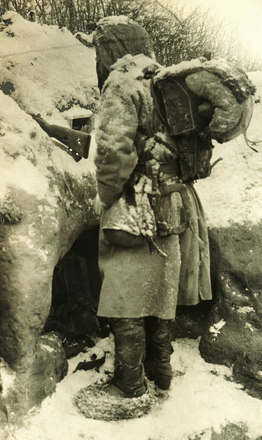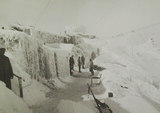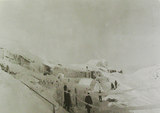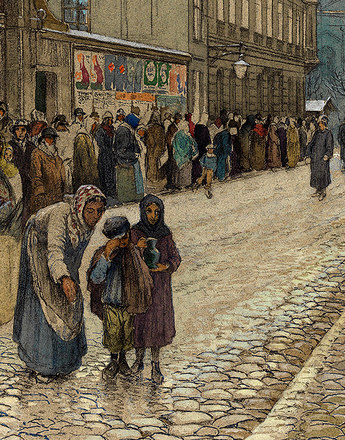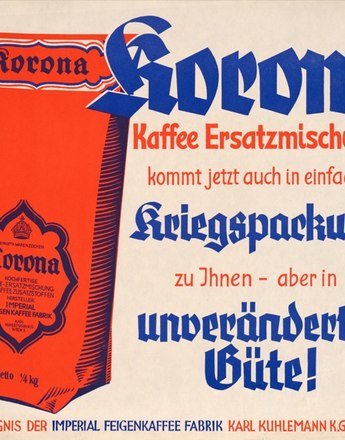The longer the war lasted, the more disillusionment and war fatigue spread among the civil population and the soldiers. The hopes of the latter, who had seen the war as a great adventure, as a great didactic force and chance to put their manhood to the test, were bitterly disappointed.
The frustration at the reality of the war is conspicuous in a letter from the volunteer Walter Schmidt: "Whatever the war wanted to teach us as people – we haven’t learned it and we never shall. We hoped for an levelling of social distinctions through getting to know each other better, we hoped for a refinement of popular taste in the pleasures of life, for a simplification of attitudes to life;, and now only the very minimum of this has come out of it and is already heading towards dissolution yet again. We have no idea about living for one another; as ever, egoism ruled in the field just as much as at home."
The hope that the war would abolish class distinctions and contribute to national unity was unfulfilled. The discrimination in treatment of the soldiers by their military superiors frequently prevented a feeling of solidarity. In addition, wealthy people were far less affected by the catastrophic shortage crisis; they could buy almost all food items on the black market. The disillusionment of all those soldiers who volunteered to go to war is put in a nutshell in an epitaph composed by Rudyard Kipling: "If any question why we died, Tell them, because our fathers lied."
On account of the foundering of the Imperial-Royal Army in autumn 1914 in Serbia and Galicia, the euphoria of many soldiers soon gave way after a few weeks to a basic mood of pessimism and resignation. The longer the war lasted, the fewer significant victories and the more drastic the economic and military exhaustion, the more the signs of disintegration within the army became evident.
The mass desertion of soldiers in the last year of the war was an expression of the disillusionment and war fatigue of the troops. The reserve corps of the Imperial-Royal Army had to mark up a missing list of around 50,000 men who refused to be called up. Exhaustion, wounding, cold and hunger lamed the men’s sense of duty and solidarity. The historian Wolfgang Maderthaner speaks of an "act of collective objection probably without parallel in the history of war", in which soldiers resisted orders and abandoned their troops. The many disturbances, protests and mutinies in the final year of the war, including the sailors’ revolt of Cattaro in February 1918 were among the signs manifesting the change of mood and the disillusionment within the Austrian-Hungarian Army. The writer and vehement objector to the war Karl Kraus criticised the concept of “war fatigue” in the magazine Die Fackel, of which he was editor, of May 1918 (no. 474):
"War fatigue – this is the most stupid word of our time. War fatigue, being tired of war means being tired of murder, tired of robbery, tired of lying, tired of being stupid, tired of hunger, tired of sickness, tired of dirt, tired of chaos. Was ever anyone fresh and bright-eyed about all this? If so, war fatigue would truly be a state that doesn’t deserve saving. People should be tired of war all the time, that is, not after but before they start the war. The war isn’t ended through war fatigue, but by refraining from it. Nations that are tired of war in its fourth year have deserved nothing better than – sticking to it!"
Translation: Abigail Prohaska
Kraus, Karl: Die Fackel, Heft 474-483, 23.5.1918, 153. Unter: http://corpus1.aac.ac.at/fackel/ (23.03.2014)
Leidinger, Hannes/Moritz, Verena: Der Erste Weltkrieg, Wien/Köln/Weimar 2011
Maderthaner, Wolfgang: „…Die Welt ist in die Hände der Menschen gefallen“ Anmerkungen zu einem zentralen Trauma der Moderne, in: Maderthaner, Wolfgang/Hochedlinger, Michael: Untergang einer Welt. Der große Krieg 1914–1918 in Photographien und Texten. Eine Publikation des Österreichischen Staatsarchivs, Wien 2013
Rauchensteiner, Manfried: Der Erste Weltkrieg und das Ende der Habsburgermonarchie 1914–1918, Wien/Köln/Weimar 2013
Sauermann, Eberhard: Literarische Kriegsfürsorge. Österreichische Dichter und Publizisten im Ersten Weltkrieg, Wien/Köln/Weimar, 2000
Überegger, Oswald: Der andere Krieg. Die Tiroler Militärgerichtsbarkeit im Ersten Weltkrieg, Innsbruck 2002
Verhey, Jeffrey: Der Geist von 1914, in: Der Tod als Maschinist. Der industrialisierte Krieg 1914–1918. Eine Ausstellung des Museums Industriekultur Osnabrück im Rahmen des Jubiläums „350 Jahre Westfälischer Friede“ 17. Mai – 23. August 1998. Katalog, Bramsche 1998, 47-53
Winkelhofer, Martina: So erlebten wir den Ersten Weltkrieg. Familienschicksale 1914–1918. Eine illustrierte Geschichte, 2. Auflage, Wien 2013
Quotes:
"Whatever the war …": Walter Schmidt, quoted from: Verhey, Jeffrey: Der Geist von 1914, in: Der Tod als Maschinist. Der industrialisierte Krieg 1914–1918. Eine Ausstellung des Museums Industriekultur Osnabrück im Rahmen des Jubiläums „350 Jahre Westfälischer Friede“ 17. Mai – 23. August 1998. Katalog, Bramsche 1998, 53 (Translation)
"If any question …": Kipling, Rudyard: Complete Verse. Definitive Edition, New York 1940, 388, quoted from: Verhey, Jeffrey: Der Geist von 1914, in: Der Tod als Maschinist. Der industrialisierte Krieg 1914–1918. Eine Ausstellung des Museums Industriekultur Osnabrück im Rahmen des Jubiläums „350 Jahre Westfälischer Friede“ 17. Mai – 23. August 1998. Katalog, Bramsche 1998, 53
"act of collective …": Maderthaner, Wolfgang: „…Die Welt ist in die Hände der Menschen gefallen“ Anmerkungen zu einem zentralen Trauma der Moderne, in: Maderthaner, Wolfgang/Hochedlinger, Michael: Untergang einer Welt. Der große Krieg 1914–1918 in Photographien und Texten. Eine Publikation des Österreichischen Staatsarchivs, Wien 2013, 33 (Translation)
"War fatigue …": Kraus, Karl: Die Fackel, Heft 474-483, 23.5.1918, 153. Unter: http://corpus1.aac.ac.at/fackel/ (23.03.2014), (Translation)

